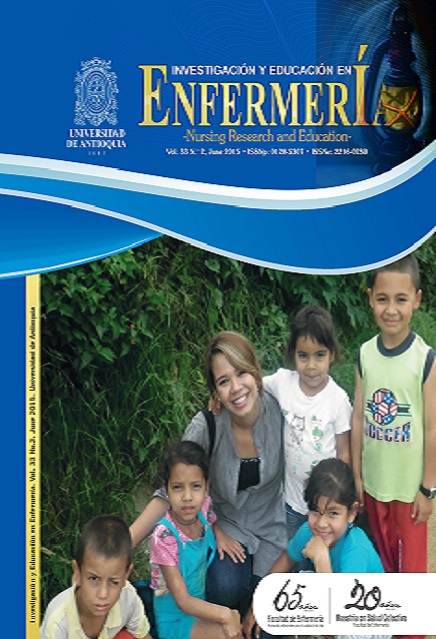Sexual debut in young adults in Cali as transition: keys for care
DOI:
https://doi.org/10.17533/udea.iee.23017Keywords:
Coitus, young adult, gender identity, transitions, public health, gender Identity.Abstract
Objectives. This work sought to understand sexual debut as a transitional process in the lives of a group of young adults and to interpret the meaning of this transition for them.
Methodology. This was a qualitative research with 18 life stories of students from different socio-economic backgrounds and with diverse sexual orientations.
Results. According to the middle-range theory of transitions, sexual debut can be considered a developmental transition. The initiative can be their own, motivated by desire, or coerced by pressure from a partner or peers in which case underlay power relations either by age or hierarchy. Its features are shaped by the individual´s abilities, knowledge, and uncertainties, as much as by the circumstances surrounding the event and the socio-cultural precepts towards the topic. It is valued as a healthy transitional process when it is agreed upon by both members of the couple, planned and flows into symmetrical relations.
Conclusion. The theory of transitions and analysis of the context are useful in understanding the phenomenon because the subjective experience is framed within normative, appreciative, and socio-cultural constructions. Nursing, as discipline, requires elements like those provided by this research to interpret the dynamics, meanings, as well as subjective and social processes in the sexual evolution of people in different contexts and historical moments.
How to cite this article: Valencia CP, Canaval GE, Sevilla TM, Orcasita LT. Sexual debut in young adults in Cali as transition: keys for care. Invest Educ Enferm. 2015; 33(2):
Downloads
References
(1) Andrade P, Betancourt D, y Palacios JR. Factores Familiares Asociado con las Conductas Sexuales en Adolescentes. Rev Colomb Psicol. 2006; 15:91-101.
(2) Benítez LM, Rueda C. Factores determinantes para la iniciación sexual y prácticas sexuales en jóvenes universitarios en Cali, Colombia. Rev Colomb Salud Libre. 2007; 2(2):90-110.
(3) Amuchasttegui A, Rivas M. Los procesos de apropiación subjetiva de los derechos sexuales: notas para la discusión. Est Demográf Urb. 2004; 19(3):543-97.
(4) Amuchasttegui A. Virginidad e iniciación sexual: la negociación dialógica de significados. Tramas. 1997; 12:167-93.
(5) Grimberg M. Iniciación sexual, prácticas sexuales y prevención al VIH/SIDA en jóvenes de sectores populares: un análisis antropológico de género. Horizontes Antropológicos 2002; 8 (17): 47-75.
(6) González AE, Montero A, Martínez V, Mena P, Varas M. Percepciones y experiencias del inicio sexual desde una perspectiva de género, en adolescentes consultantes en un centro universitario de salud sexual y reproductiva. Rev Chil Obstet Ginecol. 2010; 75(2):84-90.
(7) Jones D. Diálogo entre padres y adolescentes sobre sexualidad: Discursos morales y médicos en la reproducción de la desigualdad de género. Interface (Botucato) - Comunic Saude Educ. 2010; 14(32):171-82.
(8) González C, Henao J, Vargas E. Toma de Decisiones Sexuales y Reproductivas en la Adolescencia. Acta Colomb Psicol. 2007; 10:49-63.
(9) Siles González J. Antropología y Enfermería. La necesaria simbiosis entre dos disciplinas para vertebrar culturalmente la teoría y la praxis de los cuidados. Index Enferm. 2003; 12(43):28-32.
(10) Jacqueline Fawcett. Analysis and Evaluation of Contemporary Nursing Knowledge. Nursing Models and Theories. Philadelphia: Davis Company; 2000.
(11) Meleis AI. Theoretical nursing: development and progress. 4th ed. Philadelphia: Lippincott Williams & Wilkins; 2007.
(12) Im E. Transitions theory: A trajectory of theoretical development in nursing. Nurs Outlook. 2011; 59(5):278-85.
(13) Alzate H. Sexualidad Humana. 2nd ed. Bogotá: Editorial Temis; 1987.
(14) Weeks J. Sexuality and its Discontents: Meaning, Myths and Modern Sexualities. London: Routledges & Kegan Paul; 1985.
(15) Cornejo M, Mendoza F, Rojas R. La investigación con relatos de vida: pistas y opciones del diseño metodológico. Psykhe 2008; 17(1): 29-39.
(16) Guba EG, Lincoln YS. Effective evaluation: improving the usefulness of evaluation results approaches. San Francisco: Jossey-Bass; 1981.
(17) Hill C, Knox S, Thompson B, Nutt E, Hees S, Ladany N. Consensual Qualitative Research: An Update. J Couns Psychol. 2005; 52(2):196-205.
(18) Corrales Campuzano, D y Giraldo Mora, CV. La sexualidad en los jóvenes un mundo disonante, problemático y confictivo -vivenvias-. Invest Educ Enferm. 1996; 14(2):15-36.
(19) Osorio A, López del Burgo C, Silva C, Ruiz –Canela M., Delgado M. First sexual intercourse and subsequent regret in three developing countries. J Adolesc Health. 2012; 50:271-8.
(20) Amuchasttegui A. Virginidad e Iniciación sexual en México: La sobrevivencia de saberes sexuales subyugados frente a la modernidad. Debate Feminista.1998; 9(18):131-51.
Downloads
Published
How to Cite
Issue
Section
License
Derechos de propiedad / Direitos de Propriedade
English: If the article is accepted for publication, all copyright will be of exclusive property of Investigación y Educación en Enfermería. The text and the graphics included in the publication are exclusive responsibility of the authors and not necessarily reflect the thought of the Editorial Committee.
Español: Si el artículo es aprobado para publicación, todos los derechos son de propiedad de Investigación y Educación en Enfermería. El texto y las gráficas incluidas en la publicación son de exclusiva responsabilidad de los autores y no necesariamente refleja el pensamiento del Comité Editorial.
Português: Se o artigo for aceito para publicação, todos os direitos autorais serão de propriedade exclusiva de Investigación y Educación en Enfermería. O texto e os gráficos incluídos na publicação são de responsabilidade exclusiva dos autores e não refletem necessariamente o pensamento do Comitê Editorial.















